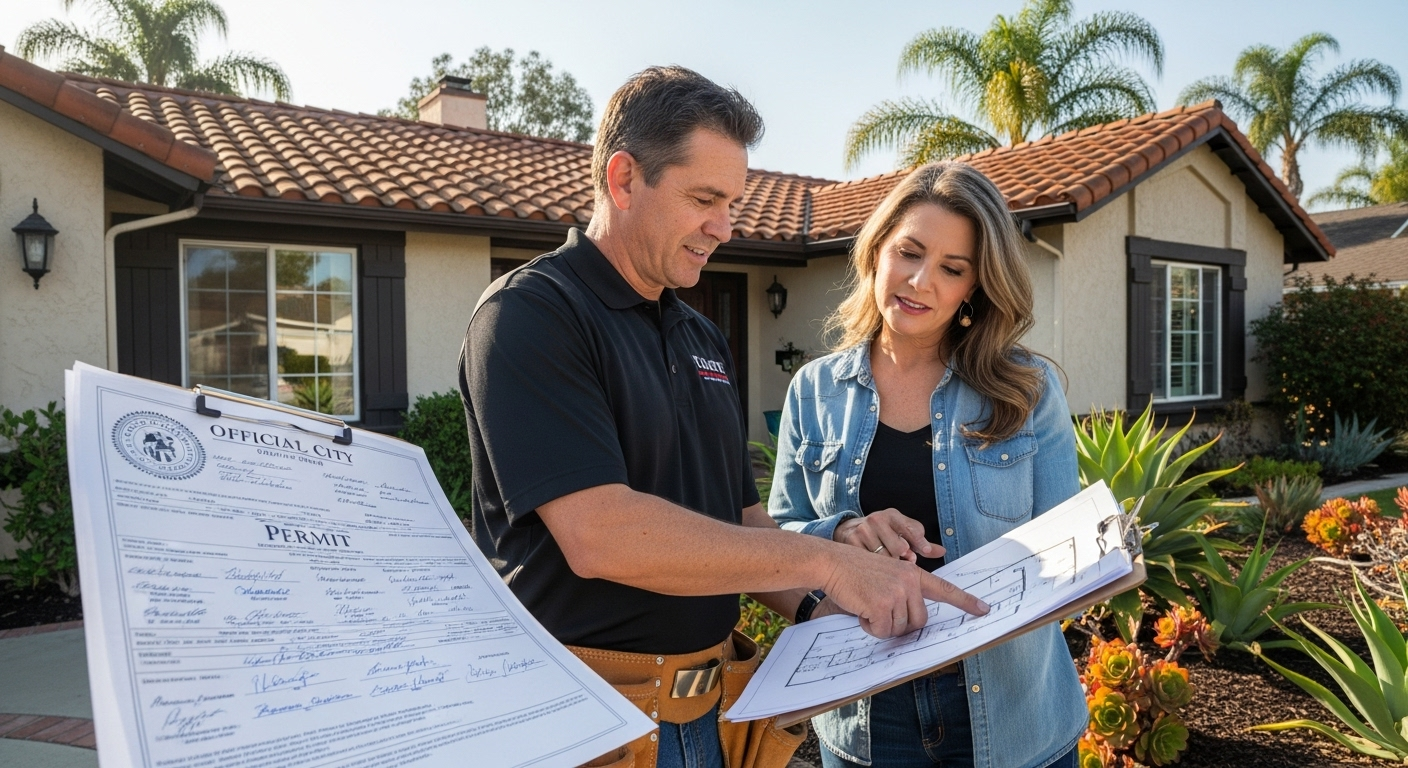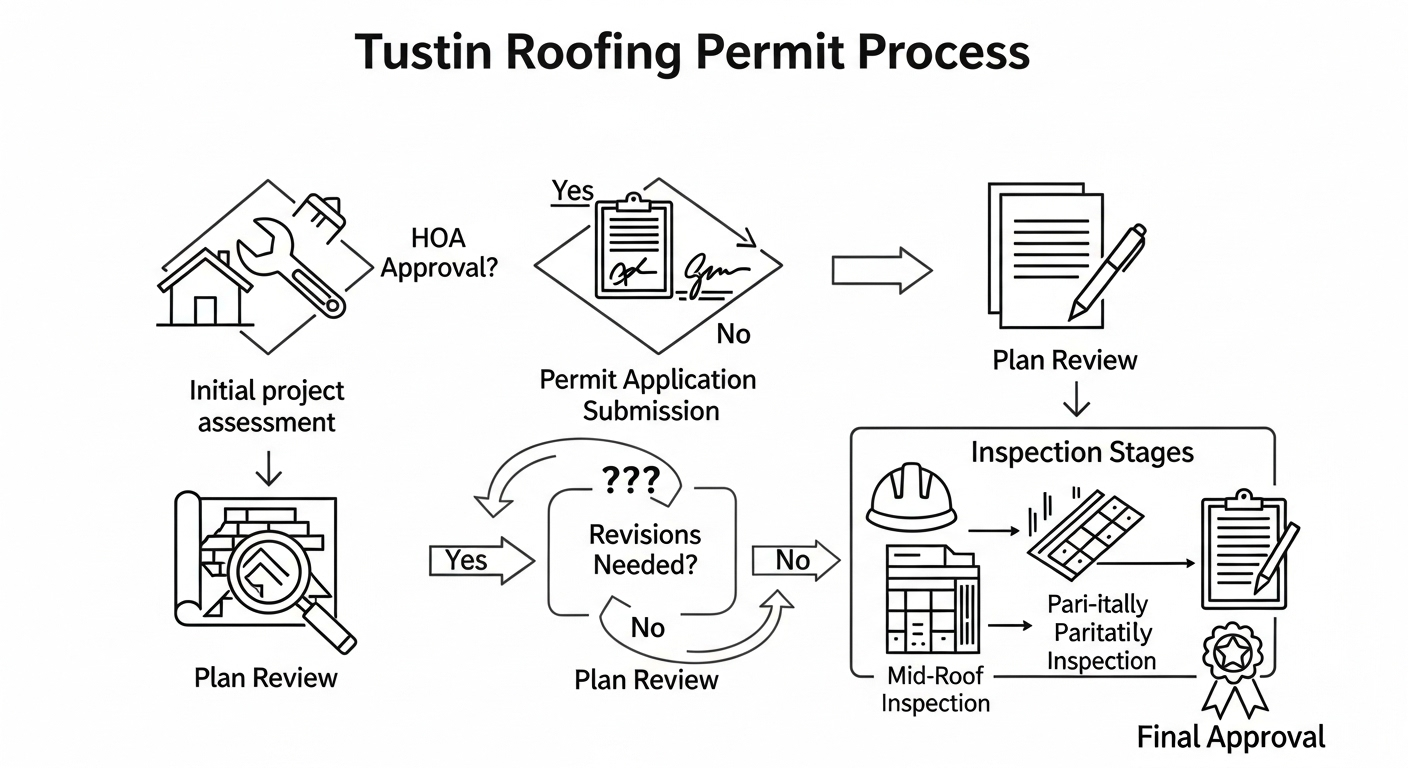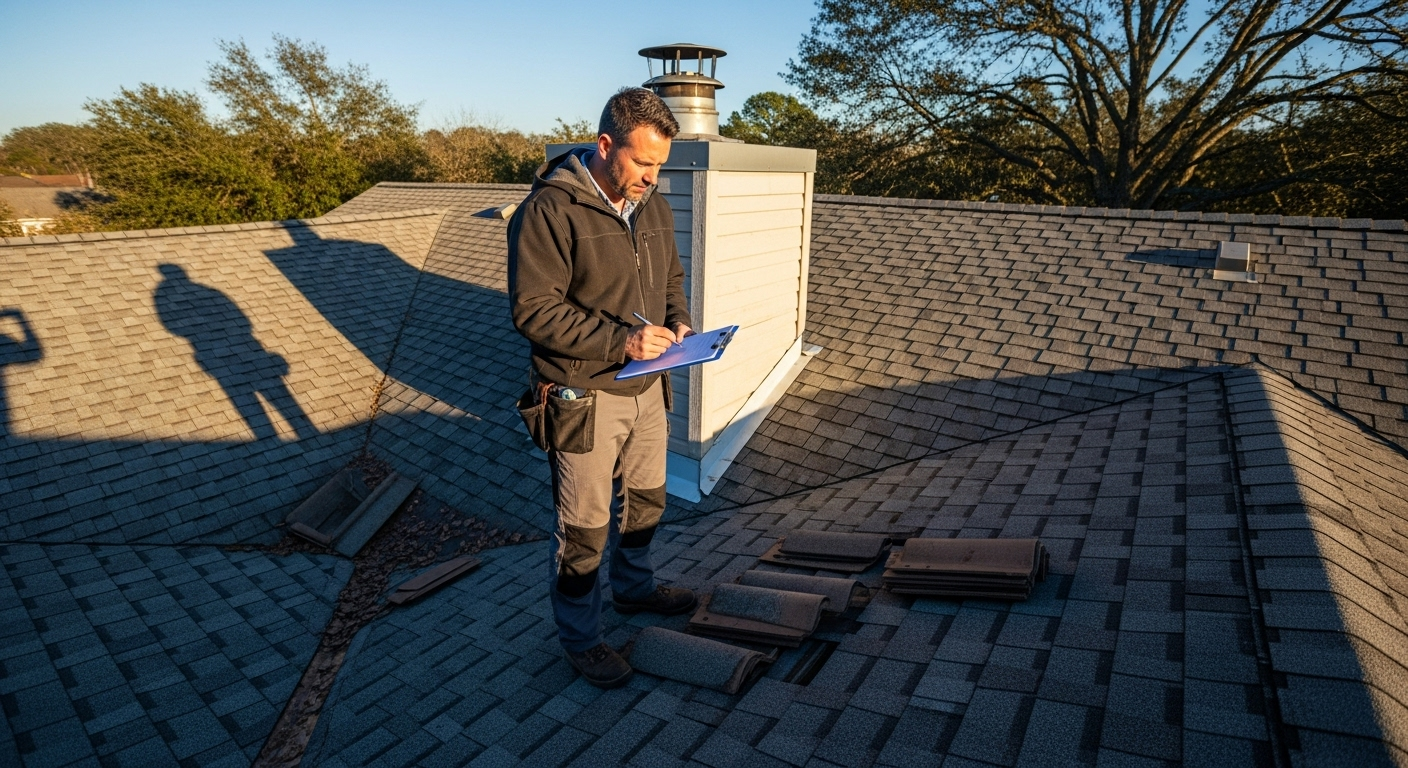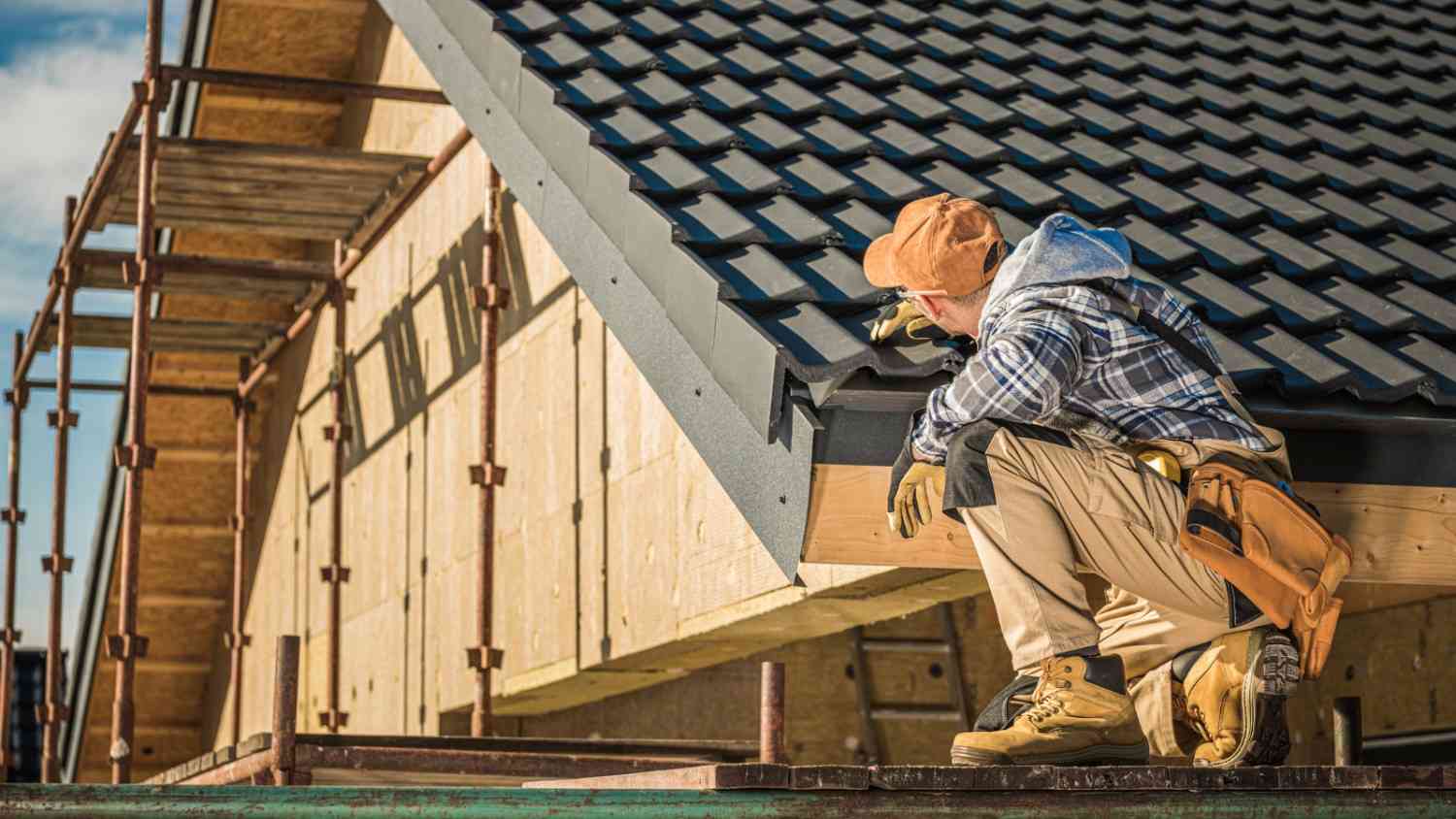Navigating roofing permits and inspections in Tustin doesn’t have to be complicated. Whether you’re planning a complete roof replacement or significant repairs, understanding the local permit process protects your investment, ensures compliance with city codes, and maintains your home’s insurability and resale value. This comprehensive guide walks Tustin homeowners through every step of the permit and inspection process, helping you avoid common pitfalls and delays.
Working with experienced Tustin roofing contractors who understand local requirements can streamline this process, but knowing what to expect empowers you to make informed decisions about your roofing project.
When Do You Need a Roofing Permit in Tustin?
Understanding when roof permit Tustin CA requirements apply is crucial for homeowners planning roofing work. The City of Tustin requires permits for most substantial roofing projects to ensure safety, structural integrity, and compliance with current building codes.
Projects Requiring Permits
Complete roof replacement always requires a permit, regardless of whether you’re changing materials or replacing like-for-like. This includes removing existing roofing materials down to the deck and installing new systems.
Structural modifications such as adding skylights, solar panels, or roof access require permits. Any work that involves cutting into the roof structure or adding load to the existing system triggers permit requirements.
Significant repairs covering more than 25% of the roof area typically require permits. This prevents piecemeal work that might compromise overall roof integrity without proper oversight.
Re-roofing over existing materials requires permits in most cases, even when not removing the old roof. The city needs to verify that the structure can support the additional weight and that proper installation methods are followed.
Work That May Not Require Permits
Minor repairs such as replacing individual damaged shingles, cleaning gutters, or applying roof coatings to small areas typically don’t require permits. However, these exceptions have limits—extensive repairs using these methods may still trigger permit requirements.
Emergency temporary repairs for storm damage usually don’t require immediate permits, but permanent repairs must follow proper permitting procedures.
HOA Considerations
Many Tustin neighborhoods have Homeowners Associations with architectural review requirements that must be satisfied before city permit applications. These approvals can add weeks to your project timeline, so plan accordingly.
The Roofing Permit Application Process
The city of Tustin building department handles all residential roofing permits through a structured application process designed to ensure code compliance and safety standards.
Required Documentation
Contractor licensing verification is mandatory for all permitted roofing work. The contractor must hold a valid California Contractor’s State License Board (CSLB) license in good standing. DIY work by homeowners requires different documentation but faces stricter scrutiny.
Project plans and specifications must detail the scope of work, materials to be used, and installation methods. For simple re-roofing projects, these can be basic drawings, but complex projects may require engineered plans.
HOA architectural approval (where applicable) must be obtained before submitting city permit applications. This approval demonstrates compliance with community standards and architectural guidelines.
Property survey or plot plan helps inspectors locate the structure and understand site access requirements for inspection purposes.
Application Submission
Applications can be submitted in person at the Tustin Civic Center or through the city’s online portal. Online submissions often process faster but may require digital copies of all supporting documents.
Permit fees vary based on project scope and valuation. Typical residential roofing permits range from $200-$800, depending on the project’s size and complexity. Fee schedules are available on the city’s website and include both base permit costs and inspection fees.
Processing timeline typically runs 3-10 business days for straightforward applications. Complex projects or incomplete applications can take significantly longer. Submitting complete, accurate applications with all required documentation prevents delays.
Common Application Mistakes
Incomplete contractor information or expired licensing can halt applications immediately. Verify all contractor credentials before submission.
Missing HOA approvals in communities that require them will result in automatic rejection. Don’t assume your neighborhood doesn’t have architectural review requirements.
Inadequate project descriptions or plans force plan reviewers to request additional information, extending processing time. Detailed initial submissions save time overall.
Tustin Roofing Inspection Checklist
Understanding what inspectors evaluate helps ensure your project passes on the first visit. Roofing inspection Tustin requirements focus on safety, weather resistance, and code compliance.
Structural and Safety Requirements
Roof deck condition must meet current standards for the intended roofing material. Inspectors check for proper fastening, adequate thickness, and structural integrity. Damaged or inadequate decking must be replaced or reinforced.
Load-bearing capacity verification ensures the structure can safely support the new roofing system. This is particularly important when changing from lighter materials like asphalt shingles to heavier options like tile.
Fall protection and safety measures during construction must comply with OSHA standards. While homeowners aren’t directly responsible for contractor safety protocols, inspectors may note inadequate safety measures.
Weather Protection Systems
Underlayment installation receives careful scrutiny. Inspectors verify proper overlap patterns, fastening methods, and material specifications. Ice and water shield placement in vulnerable areas like valleys and eaves is mandatory.
Flashing installation around chimneys, skylights, vents, and roof edges must follow manufacturer specifications and local standards. Improperly installed flashing is a leading cause of inspection failures.
Ventilation systems must provide adequate attic airflow to prevent moisture problems and extend roof life. Inspectors calculate ventilation requirements based on attic square footage and verify proper intake and exhaust placement.
Material and Installation Standards
Fastener patterns and penetration must meet or exceed manufacturer requirements and wind resistance standards. Under-driven or over-driven fasteners, incorrect spacing, or inadequate penetration can cause rejection.
Material specifications are verified against permit applications and local code requirements. Substituting different materials without approval can require new permits and delay project completion.
Drainage and water management systems must direct water away from the structure effectively. Inspectors verify proper slope, gutter installation, and downspout placement.
What Happens During Your Tustin Inspection?
Roofing inspection Tustin procedures follow a systematic approach designed to verify code compliance and installation quality. Understanding the process helps homeowners and contractors prepare effectively.
Scheduling Your Inspection
Inspections must be scheduled at least 24 hours in advance through the city’s inspection request system. Most roofing projects require multiple inspections at different stages of completion.
Pre-cover inspection occurs after underlayment and flashing installation but before final roofing material installation. This allows inspectors to verify critical weather protection systems that won’t be visible after completion.
Final inspection happens after all work is complete, including cleanup and final material installation. Inspectors verify the entire system meets code requirements and matches approved plans.
During the Inspection Visit
Inspectors typically spend 30-60 minutes evaluating residential roofing projects. They’ll check work against approved plans, verify material specifications, and test critical installation details.
Access requirements mean inspectors need safe access to all roof areas. Contractors must provide necessary ladders, scaffolding, or other access equipment. Unsafe access conditions can postpone inspections.
Weather conditions affect inspection scheduling. Inspections won’t proceed in rain, high winds, or other unsafe weather conditions. Plan for potential weather delays during your project timeline.
Inspection Outcomes
Pass results allow project completion and permit closure. You’ll receive documentation confirming code compliance that’s important for insurance and resale purposes.
Conditional pass requires minor corrections before permit closure. These items are typically cosmetic or documentation-related rather than major safety concerns.
Fail results require corrections and re-inspection. Common failure causes include improper installation methods, wrong materials, or incomplete work. Re-inspection fees apply for failed inspections.
Common Roofing Inspection Failures & How to Avoid Them
Understanding frequent roofing inspection checklist Tustin failures helps contractors and homeowners avoid delays and additional costs. Most failures stem from preventable installation or documentation issues.
Installation-Related Failures
Improper fastener installation accounts for many inspection failures. Fasteners driven too deep damage shingles and reduce wind resistance. Fasteners not driven deep enough create loose installation and potential blow-off during storms.
Inadequate flashing installation particularly around chimneys, skylights, and roof penetrations causes frequent rejections. Inspectors look for proper overlap, correct fastening methods, and appropriate sealant application.
Insufficient underlayment coverage or improper installation techniques can fail inspections. Common issues include inadequate overlap, wrong fastener types, or gaps in coverage at critical areas.
Documentation and Planning Issues
Work not matching approved plans results in automatic failure. Any changes from approved plans require permit amendments before inspection approval.
Missing required components such as ventilation systems, gutters, or required flashing details must be corrected before passing inspection.
Unlicensed contractor work discovered during inspection can void permits and require complete project restart with properly licensed contractors.
Prevention Strategies
Working with experienced, licensed contractors familiar with Tustin roofing code compliance requirements prevents most common failures. Contractors should review inspection requirements before starting work and conduct self-inspections before calling for city inspections.
Pre-inspection contractor reviews help identify potential issues before official inspections. Many contractors photograph critical installation details to document proper installation methods.
Clear communication between contractors and homeowners about project scope and requirements prevents misunderstandings that could lead to inspection failures.
Final Approval, Certificates, & Recordkeeping
Successfully completing the inspection process requires proper documentation and recordkeeping that protects your investment long-term.
Obtaining Final Approval
Certificate of completion is issued after all inspections pass and any conditional requirements are satisfied. This certificate proves your roofing work meets current building codes and safety standards.
Permit closure requires settling all fees and providing any final documentation. Open permits can create issues during home sales or insurance claims, so ensure proper closure.
Documentation Importance
Insurance requirements often mandate permitted work for claims coverage. Unpermitted roofing work can void coverage and leave homeowners liable for damage costs.
Resale value depends partly on documented code-compliant improvements. Buyers and lenders increasingly scrutinize permit records for major home improvements.
Future work builds on existing permits. Proper documentation simplifies future roofing repairs or improvements by establishing baselines for code compliance.
Record Retention
Keep all permit documentation, inspection certificates, contractor licenses, and material warranties in permanent home records. Digital copies provide backup protection against document loss.
Property transfer should include all roofing permits and certificates to new owners. This documentation protects their investment and simplifies future maintenance or improvements.
Choosing a Tustin Roofing Contractor Who Handles Permits
Working with contractors experienced in roof code compliance Orange County requirements streamlines the permit and inspection process while ensuring quality results.
Contractor Qualifications
Valid CSLB licensing is mandatory for permitted roofing work in California. Verify license status through the CSLB website and confirm the license covers roofing work specifically.
Local experience with Tustin’s requirements and inspection processes provides significant advantages. Contractors familiar with local inspectors and common requirements avoid many pitfalls that delay projects.
Insurance coverage including general liability and workers’ compensation protects homeowners from liability during construction. Request current certificates of insurance before work begins.
Questions to Ask Contractors
“How do you handle the permit process?” should receive detailed answers about application submission, inspection scheduling, and compliance verification.
“What happens if the inspection fails?” reveals the contractor’s experience level and commitment to making corrections at their expense.
“Can you provide local references?” allows verification of successful permitted projects and satisfied customers in your area.
Red Flags to Avoid
Contractors who suggest skipping permits or claim permits aren’t necessary for your project should be avoided. Legitimate contractors understand permit requirements and handle them as part of professional service.
Unusually low bids may indicate contractors planning to cut corners on permits, inspections, or code compliance. Quality permitted work has inherent costs that can’t be eliminated without compromising safety or legality.
Pressure to start immediately without permit approval indicates unprofessional practices that can create legal and financial problems for homeowners.
FAQ—Roofing Permits & Inspections in Tustin
Do all repairs need a permit in Tustin?
Minor repairs like replacing individual shingles typically don’t require permits. However, repairs covering more than 25% of the roof area, structural modifications, or work involving underlayment replacement usually require permits.
How long does the roofing permit & inspection process take?
Permit processing typically takes 3-10 business days. Add inspection scheduling time (24-48 hours) and potential re-inspection delays. Total timeline from application to final approval usually runs 2-3 weeks for straightforward projects.
What paperwork do I need to supply?
Required documents include contractor license verification, project plans, HOA approval (if applicable), and completed permit applications. Some projects may require engineered drawings or structural calculations.
Can a failed inspection delay my home sale?
Yes, open permits or failed inspections can complicate home sales. Buyers may request corrections or credits, and some lenders require completed permits before loan approval. Address inspection issues promptly to avoid sale delays.
Can I do my own roofing work in Tustin?
Homeowners can perform their own roofing work but must obtain permits and pass the same inspections as contractor work. DIY permits require additional documentation and face stricter scrutiny due to safety and quality concerns.
What happens if I skip the permit process?
Unpermitted roofing work can result in fines, forced removal of completed work, insurance coverage denial, and complications during home sales. The city can require permits retroactively, often with penalty fees.
Get Permit, Inspection & Roofing Help from Tustin Experts
Don’t let permit and inspection requirements overwhelm your roofing project. Professional roofing contractors handle these processes daily and can guide you through every step while ensuring code compliance and quality installation.
Professional permit services include:
- Complete permit application preparation and submission
- HOA approval coordination and architectural review support
- Inspection scheduling and contractor representation
- Code compliance verification and correction management
- Final approval documentation and record organization
Why choose experienced contractors:
- Thorough understanding of current Tustin building codes and requirements
- Established relationships with local inspectors and building department staff
- Proven track record of passing inspections on first attempts
- Comprehensive insurance and licensing coverage
- Ongoing support for warranty and maintenance needs
For comprehensive guidance on roofing materials and maintenance that complement proper permitting, explore our complete roofing repair and maintenance guide and material comparison resources.
Contact qualified Tustin roofing professionals for your free permit consultation and discover how proper planning and professional management make roofing projects smooth and stress-free.
This guide provides general information about Tustin’s permit and inspection processes. Building codes and requirements can change—always verify current requirements with the City of Tustin Building Department and consult qualified professionals for your specific project needs.





